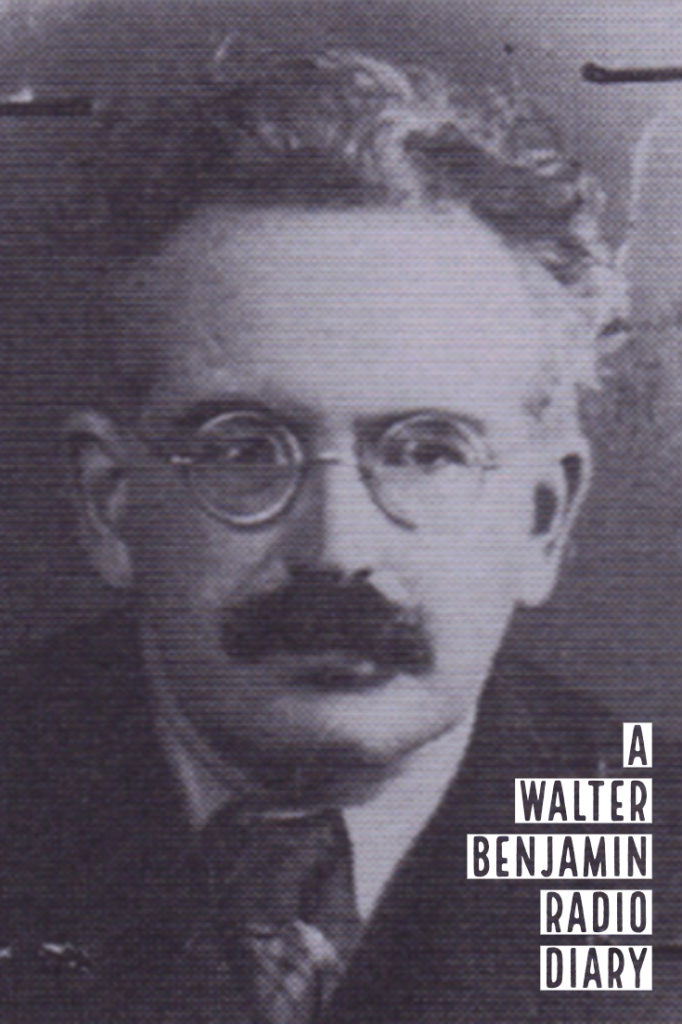
It is not clear exactly when Walter Benjamin gave his second radio talk, titled “Street Trade and Markets in the Old and New Berlin.” The editor of a volume of his broadcasts that I consult, Lecia Rosenthal, thinks that it aired in late 1929 or early 1930 on Radio Berlin. But whenever it streamed, he served up a wonderful portrait of the Magdeburger Platz and Lindenstraße indoor market halls of the period.
” . . . above all, ” Benjamin noted, “there is the smell, a mix of fish, cheese, flowers, raw meat, and fruit all under one roof, which is completely different than the open air markets and creates a dim and woozy aroma that fits perfectly with the light seeping through the murky panes of lead framed glass.”
It is a great passage. But in this diary entry, I just want to focus on one comment that Benjamin made. He was reflecting on his return to these halls, which he had not visited since his childhood. “And if I really want a special treat, I go for a walk in the Lindenstraße market in the afternoons between four and five,” he told his listeners. “Maybe someday I’ll meet one of you there. But we won’t recognize each other. That’s the downside of radio.”
Perhaps. Of course it was true that Benjamin’s listeners might not visually recognize him. But apparently it did not occur to the storyteller at that early point in his radio career that they might recognize him by his voice, such as when he spoke to a market stall merchant.
In my years writing about radio, many community radio station hosts have told me that they became truly hooked on broadcasting when, by accident, someone in their signal area recognized them as they spoke on the street or in a restaurant. Years ago I interviewed Don Foster, news/public affairs host at Pacifica stations WPFW-FM in Washington D.C. and KPFA-FM in Berkeley, California, for my second book on the Pacifica radio network. Foster described how he would sometimes hail D.C. taxis and the driver would identify him by his voice:
“One time I got in a cab in D.C. and I was going to do an interview with Jean-Bertrand Aristide, the president of Haiti, who I had met in Haiti once, and I got in the cab telling the guy I was going to the Haitian embassy, and the cab driver was a Haitian, and he says, “Are you Don Foster?” And I said, “Yeah.” And he says, “Oh, man, I listened to the report and the thing you did on Aristide!” And then when I got to the Haitian embassy he wouldn’t take my money. Wouldn’t take it [laughing]. I tried to throw it at him; so for me it was like the Academy Award, right?”
Oral History interview with Don Foster, 2002

As for me, it has been a while since I regularly spoke on any radio station. But at the University of California at Santa Cruz, where I teach, I now run an online class in which students participate in streaming video discussion sections. The other day I was working out at a gym near the campus, when I noticed several students practicing somersaults. I told them how impressed I was with their acrobatics.
“Are you Professor Matthew Lasar?” one of them exclaimed. “I’m one of your online class students!” She identified herself by name and I remembered her from one of our email exchanges. What I found most interesting was that she said that she recognized me not because of my appearance, but via the sound of my voice. I would like to think that my voice is distinctive. But it is just as likely that rather than watch the pre-recorded videos for our class, she just listened.
I do hope that at some point in Walter Benjamin’s radio career, someone heard him ordering some cheese or beer from a market vendor and cried out: “Omigod! You are Walter Benjamin! The guy who does those great talks on Radio Berlin. I loved your talk on the Berlin Schnauze. You are so awesome! We love your show!” It is one of the most satisfying moments for any radio host.
This is an ongoing diary that reacts to and reflects on Walter Benjamin’s radio talks.


